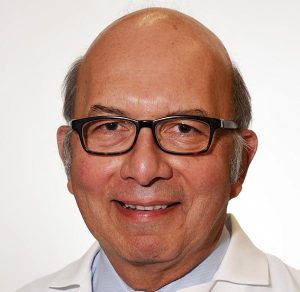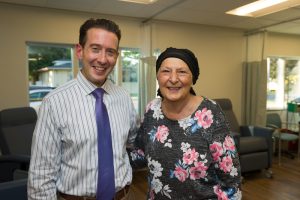
Early Signs of Inflammatory Breast Cancer
Regional Cancer Care Associates (RCCA) provides comprehensive treatment of cancer and blood disorders to patients throughout New Jersey, Connecticut, Maryland, and the Washington, DC, area.
HIPAA Alert: Potential Data Breach Learn More
Questions on Oncology, Hematology and/or Infusion Clinical Services due to COVID-19 Crisis – CALL 833-698-1623
Important Information for Our Patients Regarding the Coronavirus.
RCCA Providing Area Cancer Patients with Access to Care During Coronavirus Outbreak
RCCA Offering Patients Virtual Visits During Coronavirus Pandemic
More than 5,700 women across Maryland will be diagnosed with breast cancer this year.1
As medical oncologists who have treated thousands of patients with breast cancer, the physicians of Regional Cancer Care Associates (RCCA) know how devastating the diagnosis can be. But they also know – and want newly diagnosed women to know – that there is ample reason to look ahead with confidence and hope.
“Breast cancer is a potentially life-threatening disease, and that makes its diagnosis a life-altering event. At the same time – and without in any way diminishing the seriousness of the diagnosis – it is important for patients to know that the options for treating breast cancer in a truly individualized manner have never been greater and the outcomes we’re able to achieve have never been better,” says Frederick P. Smith, MD, a board-certified medical oncologist who treats patients at the Chevy Chase offices of RCCA, one of the nation’s largest networks of oncology specialists.

Paul Bannen, MD, adds, “The latest statistics from the American Cancer Society show that for women who were diagnosed with localized breast cancer between 2012 and 2018, the 5-year relative survival rate is 99%.”2
The board-certified medical oncologist, who practices at RCCA’s Clarksburg, Olney, and Rockville care centers, adds, “While that statistic is highly encouraging in its own right, some background information provides even more reason for hope. First, as noted, that survival rate is for women diagnosed between 2012 and 2018. The five years that have passed since the end of that period have seen significant advances in everything from the imaging approaches employed to detect breast cancer in its earliest stages to the therapies used to treat the disease. As a result, outcomes today are even better than they were in 2018, and that improvement in outcomes pertains not only to localized breast cancer — -which represents the great majority of new diagnoses – but also to women whose disease has spread to nearby structures or lymph nodes or to distant organs, such as the lungs, liver, or bones. Many of the new therapies approved in recent years are for the treatment of metastatic breast cancer. Those treatments allow us to significantly extend people’s lives in a way that provides them with a good quality of life.”

Holly Dushkin, MD, says, “The improved outcomes we’re achieving in breast cancer are directly related to our increased ability to tailor treatment to the specifics of each patient and her disease. That individualization of care typically begins with surgery, with lumpectomy or other breast-conserving surgery being an option for many women based on the location and extent of the cancer. However, the ability to customize care is even greater when it comes to the medical management of breast cancer, which generally follows surgery and sometimes is provided in conjunction with radiation therapy. In developing a treatment plan, we’re able to consider factors ranging from the tumor’s stage, hormone-receptor status, and genetic composition to the patient’s family history and overall health as we select from a wide range of therapies to implement an individualized treatment strategy.”
Dr. Dushkin, a board-certified medical oncologist who practices with RCCA in Chevy Chase, adds, “Options for medical management include targeted therapies, which act against a tumor’s specific genetic mutations; immunotherapy, which harnesses the power of the body’s own immune system to recognize and attack cancer cells; oral and intravenous chemotherapy; and hormonal treatments. The latest breast cancer treatment guidelines from the National Comprehensive Cancer Network, or NCCN, are 256 pages long.3 That is more than double their length from just a few years ago and reflects how much we’ve been able to identify evidence-based treatment strategies for different types and stages of breast cancer. And by the way, the NCCN’s 2023 guidelines had already been updated twice by March of this year – that’s how fast new treatments and approaches are being adopted.”
The RCCA oncologists add that advances in treating breast cancer have been accompanied by progress in delivering the latest therapies in community-based settings near patients’ homes. They explain that the innate stress of contending with cancer can be increased by having to travel a long distance to receive care, or by having to deal with city traffic and parking, and needing to navigate through a large hospital. By contrast, at community-based care centers such as RCCA’s locations in Chevy Chase, Clarksburg, Olney, and Rockville, people can receive the same FDA-approved agents and evidence-based, guidelines-recommended treatment strategies offered at academic medical centers in Washington, DC; Philadelphia; or New York. RCCA’s community-based care centers also offer access to dozens of clinical trials and cutting-edge diagnostics, including genomic assessments, in convenient, comforting settings where all staff members come to know each patient and the patient’s family very well.
*******
Drs. Smith, Bannen, and Dushkin – along with board-certified medical oncologists Frederick Barr, MD, who practices at RCCA’s Chevy Chase office, and Chitra Rajagopal, MD, who practices at RCCA’s Clarksburg, Olney, and Rockville care centers — are among the 90+ cancer specialists who treat patients at more than 20 RCCA care centers located throughout New Jersey, Connecticut, Maryland, and the Washington, DC, area. RCCA oncologists and hematologists see more than 23,000 new patients each year and provide care to more than 225,000 established patients, collaborating closely with their patients’ other physicians. They offer patients the latest in cutting-edge treatments, including immunotherapies and targeted therapy, as well as access to a wide range of clinical trials. In addition to serving patients who have solid tumors, blood-based cancers, and benign blood disorders such as anemia, RCCA care centers also provide infusion services to people with a number of non-oncologic conditions—including multiple sclerosis, Crohn’s disease, asthma, iron-deficiency anemia, and rheumatoid arthritis—who take intravenously-administered medications.
To learn more about RCCA, call 1-844-346-7222 or visit RCCA.com.
References:
Location | Average annual count, 2015-2019 | Recent 5-year trend |
United States | 253,845 | Rising |
Maryland | 5054 | Stable |
Allegany County | 68 | Stable |
Anne Arundel County | 470 | Stable |
Baltimore City | 465 | Stable |
Baltimore County | 805 | Rising |
Calvert County | 74 | Stable |
Caroline County | 25 | Falling |
Carroll County | 151 | Stable |
Cecil County | 78 | Stable |
Charles County | 116 | Stable |
Dorchester County | 30 | Stable |
Frederick County | 203 | Stable |
Garrett County | 28 | Stable |
Harford County | 242 | Stable |
Howard County | 264 | Stable |
Kent County | 20 | Stable |
Montgomery County | 828 | Stable |
Prince George’s County | 717 | Stable |
Queen Anne’s County | 44 | Stable |
Somerset County | 22 | Stable |
Talbot County | 45 | Stable |
Washington County | 132 | Rising |
Wicomico County | 82 | Stable |
Worcester County | 60 | Stable |
Source: National Cancer Institute. State Cancer Profiles. Available at: https://statecancerprofiles.cancer.gov/. Accessed March 23, 2023.
For more information or to schedule an appointment,
call 844-346-7222. You can also schedule an appointment by calling the RCCA location nearest you.

Regional Cancer Care Associates (RCCA) provides comprehensive treatment of cancer and blood disorders to patients throughout New Jersey, Connecticut, Maryland, and the Washington, DC, area.

When people think of breast cancer, they generally think of it affecting women. However, in rare circumstances, breast cancer can affect men, most commonly in

First diagnosed with breast cancer in 1992, she has persevered in her battle against the disease for more than 30 years.

Regional Cancer Care Associates is one of fewer than 200 medical practices in the country selected to participate in the Oncology Care Model (OCM); a recent Medicare initiative aimed at improving care coordination and access to and quality of care for Medicare beneficiaries undergoing chemotherapy treatment.